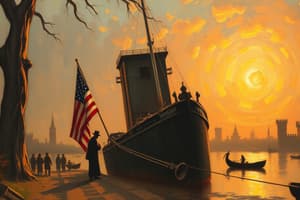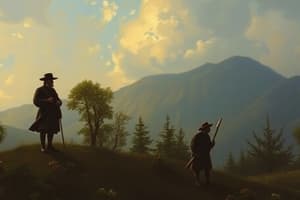Podcast
Questions and Answers
Which of the following best describes the core belief of anti-imperialists regarding foreign policy?
Which of the following best describes the core belief of anti-imperialists regarding foreign policy?
- The United States should aggressively acquire overseas territories to secure resources and project power.
- Each nation should have the right to determine its own governance without external interference. (correct)
- A strong navy is essential for protecting American interests and promoting global trade.
- The United States has a moral obligation to spread democracy and capitalism around the world.
The primary goal of muckrakers during the Progressive Era was to celebrate the successes of big businesses and political machines.
The primary goal of muckrakers during the Progressive Era was to celebrate the successes of big businesses and political machines.
False (B)
What was the primary economic motivation behind American imperialist expansion during Period 7?
What was the primary economic motivation behind American imperialist expansion during Period 7?
access to raw materials
The Platt Amendment, imposed on Cuba after the Spanish-American War, allowed the US to intervene ______ in Cuba if American interests were threatened.
The Platt Amendment, imposed on Cuba after the Spanish-American War, allowed the US to intervene ______ in Cuba if American interests were threatened.
Match each individual with their contribution to either imperialist or anti-imperialist sentiment:
Match each individual with their contribution to either imperialist or anti-imperialist sentiment:
How did yellow journalism contribute to the Spanish-American War?
How did yellow journalism contribute to the Spanish-American War?
The Open Door Policy aimed to establish exclusive American trading rights in China.
The Open Door Policy aimed to establish exclusive American trading rights in China.
What territories did the United States gain control over as a result of the Spanish-American War?
What territories did the United States gain control over as a result of the Spanish-American War?
The 17th Amendment provided for the direct election of ______ by the people.
The 17th Amendment provided for the direct election of ______ by the people.
Match each amendment with its focus:
Match each amendment with its focus:
Which of the following best describes the impact of Upton Sinclair's The Jungle?
Which of the following best describes the impact of Upton Sinclair's The Jungle?
Frederick Taylor's work focused on making politics more efficient.
Frederick Taylor's work focused on making politics more efficient.
Name one specific legislative reform that Progressives implemented to increase direct democracy.
Name one specific legislative reform that Progressives implemented to increase direct democracy.
Josiah Strong advocated for imperial expansion based on the idea that the ______ race was superior.
Josiah Strong advocated for imperial expansion based on the idea that the ______ race was superior.
Match the muckraker with the focus of their investigative journalism:
Match the muckraker with the focus of their investigative journalism:
Which of the following factors contributed to the rise of the Progressive Era?
Which of the following factors contributed to the rise of the Progressive Era?
The annexation of Hawaii was primarily motivated by the desire to spread American democratic ideals.
The annexation of Hawaii was primarily motivated by the desire to spread American democratic ideals.
What was the purpose of the 'recall' reform during the Progressive Era?
What was the purpose of the 'recall' reform during the Progressive Era?
Alfred Thayer Mahan's book, The Influence of Sea Power upon History, argued that a strong ______ was essential for a nation's power and prosperity.
Alfred Thayer Mahan's book, The Influence of Sea Power upon History, argued that a strong ______ was essential for a nation's power and prosperity.
Which event is most directly associated with the beginning of the Spanish-American War?
Which event is most directly associated with the beginning of the Spanish-American War?
Which of the following best explains why maize cultivation was significant to the development of American Indian societies?
Which of the following best explains why maize cultivation was significant to the development of American Indian societies?
Which statement best describes the long-term impact of the Columbian Exchange?
Which statement best describes the long-term impact of the Columbian Exchange?
How did mercantilism influence the economic relationship between Britain and its American colonies?
How did mercantilism influence the economic relationship between Britain and its American colonies?
What was the underlying cause of the First Great Awakening?
What was the underlying cause of the First Great Awakening?
What was the primary weakness of the Articles of Confederation?
What was the primary weakness of the Articles of Confederation?
What was the main goal of the Proclamation of 1763?
What was the main goal of the Proclamation of 1763?
Which of the following best describes the concept of judicial review established during Period 4?
Which of the following best describes the concept of judicial review established during Period 4?
How did the Second Great Awakening influence American society during Period 4?
How did the Second Great Awakening influence American society during Period 4?
What was the significance of Manifest Destiny in the mid-19th century?
What was the significance of Manifest Destiny in the mid-19th century?
How did the economic differences between the North and the South contribute to the Civil War?
How did the economic differences between the North and the South contribute to the Civil War?
What was the main objective of the Reconstruction period after the Civil War?
What was the main objective of the Reconstruction period after the Civil War?
How did the Second Industrial Revolution influence the relationship between business and labor?
How did the Second Industrial Revolution influence the relationship between business and labor?
How did Progressives try to address the problems caused by industrialization and urbanization?
How did Progressives try to address the problems caused by industrialization and urbanization?
How did the New Deal attempt to address the challenges of the Great Depression?
How did the New Deal attempt to address the challenges of the Great Depression?
How did the Cold War impact domestic policy and society in the United States?
How did the Cold War impact domestic policy and society in the United States?
Flashcards
Imperialism
Imperialism
The expansion of a country's political, economic, and military influence over another.
Imperialists
Imperialists
Belief in growth to obtain valuable raw materials and new markets.
Social Darwinism
Social Darwinism
Justification for expansion based on the idea of the "survival of the fittest."
Alfred Thayer Mahan
Alfred Thayer Mahan
Signup and view all the flashcards
Self Determination
Self Determination
Signup and view all the flashcards
Isolationism
Isolationism
Signup and view all the flashcards
Yellow Journalism
Yellow Journalism
Signup and view all the flashcards
Platt Amendment
Platt Amendment
Signup and view all the flashcards
Open Door Policy
Open Door Policy
Signup and view all the flashcards
Muckrakers
Muckrakers
Signup and view all the flashcards
The Jungle
The Jungle
Signup and view all the flashcards
Jacob Riis
Jacob Riis
Signup and view all the flashcards
Secret Ballot
Secret Ballot
Signup and view all the flashcards
Direct Election of Senators
Direct Election of Senators
Signup and view all the flashcards
Prohibition
Prohibition
Signup and view all the flashcards
Women's Suffrage
Women's Suffrage
Signup and view all the flashcards
Initiative
Initiative
Signup and view all the flashcards
Referendum
Referendum
Signup and view all the flashcards
Recall
Recall
Signup and view all the flashcards
Frederick Taylor
Frederick Taylor
Signup and view all the flashcards
Maize (Corn)
Maize (Corn)
Signup and view all the flashcards
Christopher Columbus
Christopher Columbus
Signup and view all the flashcards
"God, Gold, Glory"
"God, Gold, Glory"
Signup and view all the flashcards
Encomienda System
Encomienda System
Signup and view all the flashcards
Columbian Exchange
Columbian Exchange
Signup and view all the flashcards
Mercantilism
Mercantilism
Signup and view all the flashcards
Cash Crops
Cash Crops
Signup and view all the flashcards
First Great Awakening
First Great Awakening
Signup and view all the flashcards
French and Indian War
French and Indian War
Signup and view all the flashcards
Articles of Confederation
Articles of Confederation
Signup and view all the flashcards
U.S. Constitution
U.S. Constitution
Signup and view all the flashcards
Federalist papers
Federalist papers
Signup and view all the flashcards
Judicial Review
Judicial Review
Signup and view all the flashcards
American System
American System
Signup and view all the flashcards
Bill of Rights
Bill of Rights
Signup and view all the flashcards
Study Notes
Imperialism
- Social Darwinists thought the white Anglo-Saxon race was the most evolved and saw it as their Christian responsibility to spread influence.
- Alfred Thayer Mahan thought a strong navy would secure foreign markets and gain territories for refueling, leading Congress to create a new steel fleet.
Progressive Era
- The growing power of businesses, economic uncertainties, violent labor conflicts, the power of political machines, Jim Crow segregation, women's suffrage, and alcohol are what led to the start of the Progressive Era.
- Protestant church leaders, feminists, union leaders, and African Americans became involved in the Progressive Era.
Expansion of Democracy
- Progressives wanted to challenge the influence of political bosses using a secret ballot, ensuring fair elections.
- The 17th Amendment (1913) was created allowing the direct election of senators by the people, and not just state legislatures.
- The 19th Amendment (1920) made it so women were allowed to vote.
Legislative Reforms
- Frederick Taylor advocated for scientific management in 1909 and wanted to make factories more efficient.
Studying That Suits You
Use AI to generate personalized quizzes and flashcards to suit your learning preferences.




